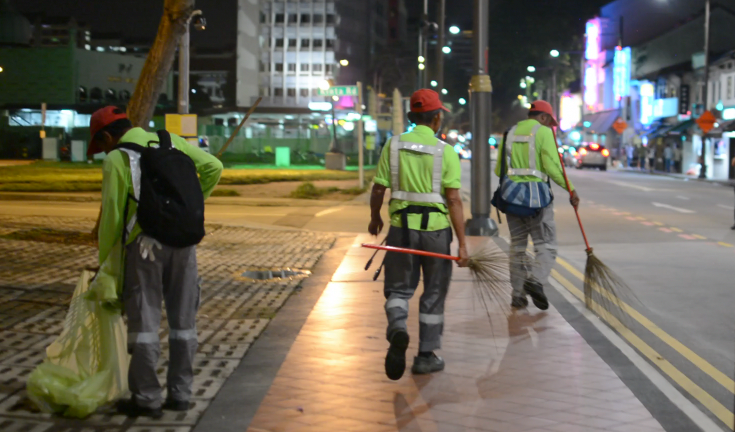By Jolovan Wham, Executive Director, Humanitarian organisation for Migration Economics (HOME)
While the cleaning accreditation scheme’s S$1,000 basic salary requirement will increase the incomes of Singaporean cleaners, the Humanitarian Organization for Migration Economics (HOME) is concerned that migrant workers have been left out. (“52,000 cleaners set for better training, pay as licensing scheme takes hold”; Sept 2)
Local cleaners are not the only ones who need an income boost. In our experience, many of the migrant Chinese, Malaysians and Bangladeshis working in this sector earn below the basic salary mandated under the accreditation scheme.
Bangladeshi workers contracted by town councils to clean public housing estates are among the worst paid of the lot, with salaries as low as S$2 per hour. Many of them work more than 12 hours a day without days off.
Our interviews with migrant workers in the sector also show that they are expected to work longer hours and more days than local employees.
This latest wage floor is thus going to incentivise the hiring of foreign workers at minimum cost, and not address the fact that cleaners in general are paid inadequately.
Singapore prides itself on meritocracy and equal opportunity for all, so to exclude migrant workers from this scheme is inconsistent with these values.
Both migrant and local workers are performing the same services for the nation.
In the wake of the Little India riot, there has been a lot of discussion about integrating migrant workers. But integration is not only about policing undesirable behaviour and addressing social ills.
It requires us to treat those who are marginalised as equals and implement anti-discrimination measures.
Ensuring that migrant workers are paid equally to locals is one of many things we can do, and the Government, the labour movement and employers should review the accreditation scheme so that it is truly inclusive.
This letter was first published on Today’s Voices section.
Editor’s footnote (Terry) – While some may argue that foreigners should not be entitled to more pay than locals and they should be contented at getting a higher pay than what they could have earned in their home country. But apart from the point of equality which Jolovan has pointed out, foreign workers working the same work load if not more than locals. People need to realise that it is the pay difference between the foreign workers and local workers in most cases that is stagnating the pay of professions as well as the discrimination against locals when it comes to employability. Be it engineers, production workers or service providers like cleaners.
In some cases, its the lack of protection for the foreign workers which might encourage employers to employ foreign workers in favor of locals. Example is the case of the foreign cleaners from Bangladesh at Pasir Ris GRC being paid $700 per month, 7 days a week, over 10 hours a day without overtime pay and asked to pay $10,800 in agent fees. (read more)
Should the pay between foreign workers and local workers be equalised, employers would probably not lean excessively towards that one particular group when it comes to job opportunities. Apart from the emotional distress knowing that foreigners are earning the same as locals, what else is there to oppose paying the foreign workers the same?




